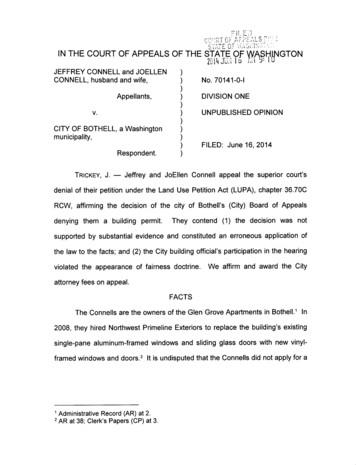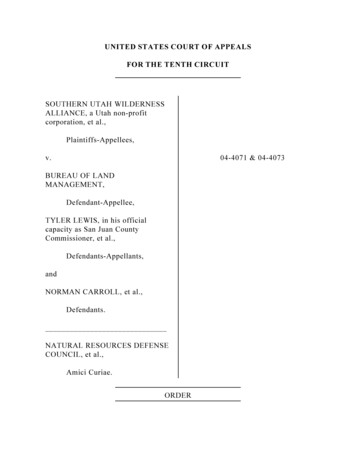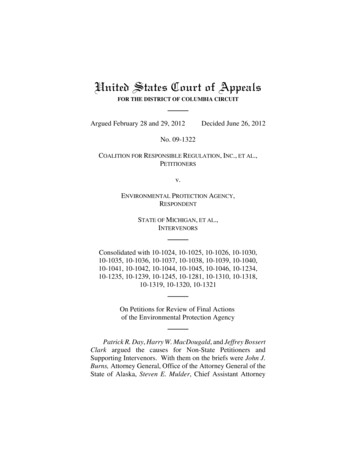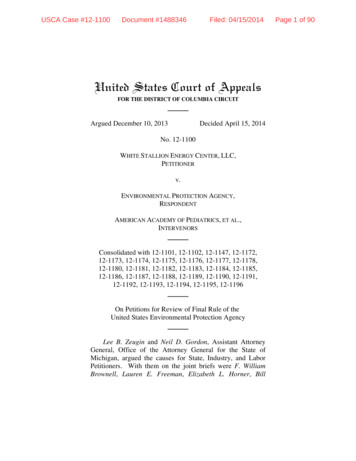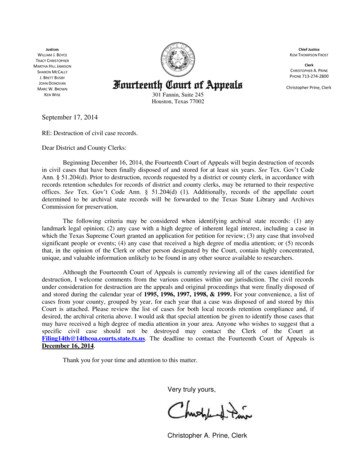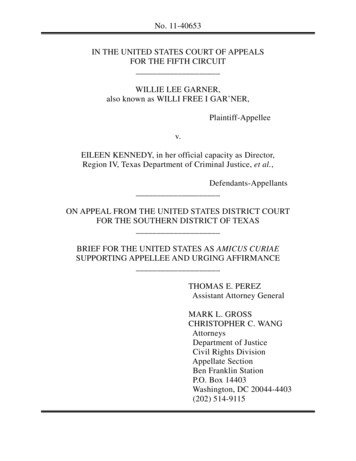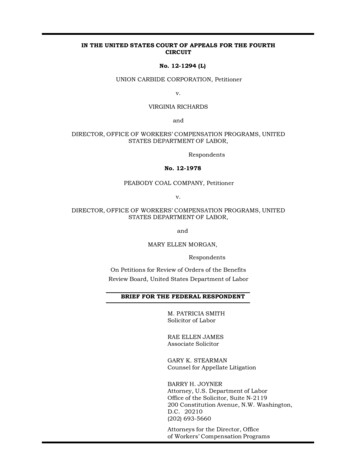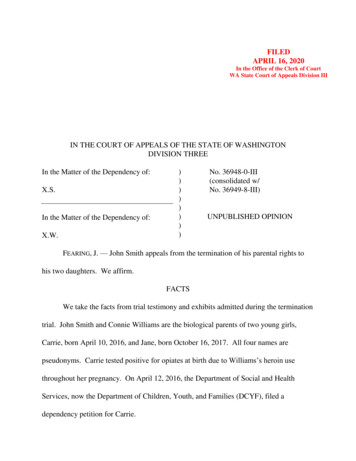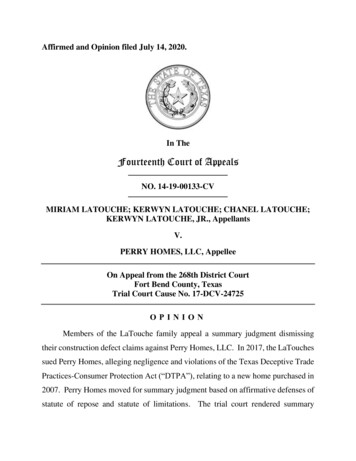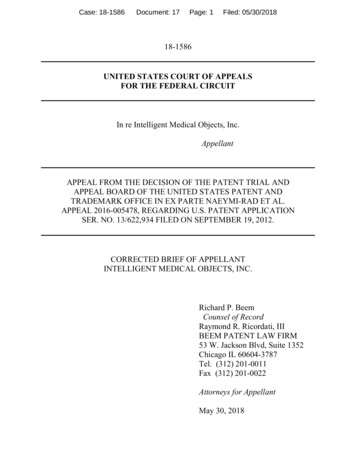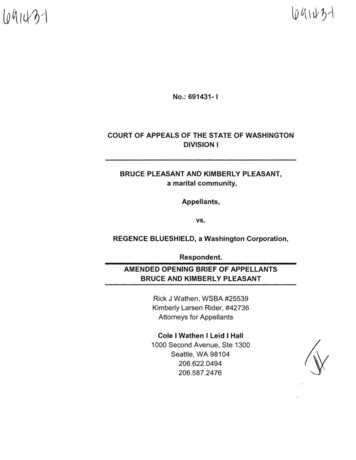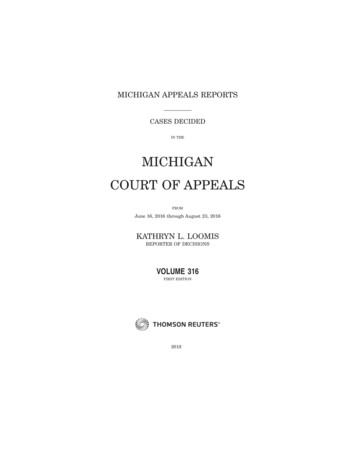
Transcription
MICHIGAN APPEALS REPORTSCASES DECIDEDIN THEMICHIGANCOURT OF APPEALSFROMJune 16, 2016 through August 23, 2016KATHRYN L. LOOMISREPORTER OF DECISIONSVOLUME 316FIRST EDITION2018
Copyright 2018The paper used in this publication meets the minimumrequirements of American National Standard for InformationSciences—Permanence of Paper for Printed Library Materials, ANSI Z39.48-1984.
COURT OF APPEALSCHIEF JUDGETERM EXPIRESJANUARY 1 OFMICHAEL J. TALBOT.2021CHIEF JUDGE PRO TEMCHRISTOPHER M. MURRAY .2021JUDGESDAVID SAWYER .WILLIAM B. MURPHY .MARK J. CAVANAGH .KATHLEEN JANSEN .HENRY WILLIAM SAAD.JOEL P. HOEKSTRA .JANE E. MARKEY .PETER D. O’CONNELL .KURTIS T. WILDER.PATRICK M. METER .DONALD S. OWENS .KIRSTEN FRANK KELLY .KAREN FORT HOOD.STEPHEN L. BORRELLO .DEBORAH A. SERVITTO .JANE M. BECKERING .ELIZABETH L. GLEICHER .CYNTHIA DIANE STEPHENS.MICHAEL J. KELLY .DOUGLAS B. SHAPIRO .AMY RONAYNE KRAUSE.MARK T. BOONSTRA .MICHAEL J. RIORDAN .MICHAEL F. GADOLA.COLLEEN A. O’BRIEN .CHIEF CLERK: JEROME W. ZIMMER, JR.RESEARCH DIRECTOR: JULIE ISOLA 172017
SUPREME COURTTERM EXPIRESJANUARY 1 OFCHIEF JUSTICEROBERT P. YOUNG, JR. . 2019JUSTICESSTEPHEN J. MARKMAN .BRIAN K. ZAHRA.BRIDGET M. MCCORMACK .DAVID F. VIVIANO .RICHARD H. BERNSTEIN.JOAN L. LARSEN.202120232021201720232017COMMISSIONERSDANIEL C. BRUBAKER, CHIEF COMMISSIONERSHARI M. OBERG, DEPUTY CHIEF COMMISSIONERTIMOTHY J. RAUBINGERNELSON S. LEAVITTDEBRA A. GUTIERREZ-MCGUIREANNE-MARIE HYNOUS VOICEDON W. ATKINSJÜRGEN O. SKOPPEKMICHAEL S. WELLMANGARY L. ROGERSRICHARD B. LESLIEKATHLEEN M. DAWSONSAMUEL R. SMITHANNE E. ALBERSAMY L. VANDYKEAARON J. GAUTHIERSTATE COURT ADMINISTRATORMILTON L. MACK, JR.CLERK: LARRY S. ROYSTERREPORTER OF DECISIONS: CORBIN R. DAVISCRIER: DAVID G. PALAZZOLO
TABLE OF CASES REPORTEDPAGEAAllegan County, Sau-Tuk Industries, Inc v .Allstate Ins Co, Southeast Michigan SurgicalHospital, LLC v .Application of Consumers Energy to IncreaseElectric Rates, In re (On Remand) .Assy, People v .122657231302BBank of America, NA v Fidelity National TitleIns Co . 480Baynesan v Wayne State Univ . 643Berry v Garrett . 37Biddles, People v . 148CCampbell, People v . 279Cramer v Village of Oakley . 60DDavis-Christian, People v . 204Dep’t of Environmental Quality, Grass LakeImprovement Bd v . 356Dep’t of Environmental Quality, SouthDearborn Environmental ImprovementAss’n, Inc v . 265i
ii316 MICH APPPAGEDep’t of Treasury, International BusinessMachines Corp v . 346Director of Elections, O’Connell v . 91EEnvironmental Quality (Dep’t of), Grass LakeImprovement Bd v . 356Environmental Quality (Dep’t of), SouthDearborn Environmental ImprovementAss’n, Inc v . 265FFidelity National Title Ins Co, Bank ofAmerica, NA v . 480Forfeiture of 2000 GMC Denali & Contents,In re . 562GGarnes, People v . 339Garrett, Berry v . 37Grass Lake Improvement Bd v Dep’t ofEnvironmental Quality . 356HHeller, People v . 314Henry Ford Health System, Laster v . 726Hyatt, People v . 368IIn re Application of Consumers Energy toIncrease Electric Rates (On Remand) . 231In re Forfeiture of 2000 GMC Denali &Contents . 562In re Jones . 110
TABLE OF CASES REPORTEDiiiPAGEIn re Klein Estate . 329In re Martin . 73In re Petition of Allegan County Treasurer forForeclosure . 122International Business Machines Corp v Dep’tof Treasury . 346JJendrusina v Mishra . 621Jones, In re . 110KKennedy, Williams v . 612Kent Foundry Co, Luce v . 27Klein Estate, In re . 329LLake v Putnam . 247Laster v Henry Ford Health System . 726Lopez, People v . 704Luce v Kent Foundry Co . 27MMajor v Village of Newberry . 527Martin, In re . 73McNeill-Marks v MidMichigan MedicalCenter-Gratiot .1Metro Direct Property & Casualty Ins Co,Scugoza v . 218MidMichigan Medical Center-Gratiot,McNeill-Marks v .1Mishra, Jendrusina v . 621
iv316 MICH APPPAGEOO’Connell v Director of Elections .PPeople v Assy .People v Biddles .People v Campbell .People v Davis-Christian .People v Garnes .People v Heller .People v Hyatt .People v Lopez .People v Pinkney .People v Simmons .People v Solloway .People v Taylor .People v Traver .People v Ventura .People v Watkins .Petition of Allegan County Treasurer forForeclosure, In re .Pinkney, People v .Providence Hospital & Medical Centers, Inc,Trowell v .Putnam, Lake v .SSau-Tuk Industries, Inc v Allegan County .Scugoza v Metro Direct Property & CasualtyIns Co .Simmons, People v .Solloway, People v 50680247122218322174
TABLE OF CASES REPORTEDvPAGESouth Dearborn Environmental ImprovementAss’n, Inc v Dep’t of EnvironmentalQuality . 265Southeast Michigan Surgical Hospital, LLC vAllstate Ins Co . 657TTaylor, People v .Traver, People v .Treasury (Dep’t of), International BusinessMachines Corp v .Trowell v Providence Hospital & MedicalCenters, Inc .Tyler v Tyler .52588346680214VVentura, People v . 671Village of Newberry, Major v . 527Village of Oakley, Cramer v . 60WWatkins, People v . 52Wayne State Univ, Baynesan v . 643Williams v Kennedy . 612
COURT OF APPEALS CASES
MCNEILL-MARKS V MIDMICH MED CTR1McNEILL-MARKS v MIDMICHIGAN MEDICAL CENTER-GRATIOTDocket No. 326606. Submitted June 8, 2016, at Lansing. Decided June 16,2016, at 9:00 a.m. Leave to appeal sought.Tammy McNeill-Marks brought an action in the Gratiot CircuitCourt against MidMichigan Medical Center-Gratiot (MMCG),alleging that MMCG’s decision to terminate her employmentviolated both the Whistleblowers’ Protection Act (WPA), MCL15.361 et seq., and Michigan public policy because MMCG terminated her for either reporting a violation of a personal protectionorder (PPO) to her attorney or for being about to report thatviolation to the circuit court. Plaintiff, a clinical manager atMMCG, had adopted three children. The children’s grandmother,Marcia Fields, had threatened to kill plaintiff, plaintiff’s adoptedchildren, and plaintiff’s biological children during the adoptionprocess. Plaintiff sought and was granted a series of PPOsagainst Fields. The PPO at issue ordered Fields, among otherthings, to refrain from stalking plaintiff as defined under MCL750.411h and MCL 750.411i. Plaintiff subsequently encounteredFields in a hallway at MMCG. Fields was in a wheelchair andsaid, “Hello, Tammy,” in a sing-song vocal tone that plaintiffdescribed as “the cat that just ate the canary,” indicating toplaintiff that Fields knew she had “gotten away with somethingshe’s not supposed to do.” Plaintiff informed her supervisor aboutthe situation and then called her attorney to tell him that Fieldshad appeared at MMCG; however, at no time did plaintiff tell herattorney that Fields was a patient at MMCG. Later that evening,while Fields was still a patient at MMCG, a process server fromthe attorney’s law office served Fields with the PPO in herhospital room. Fields and her family reported the incident toMMCG as a suspected violation of the Health Insurance Portability and Accountability Act (HIPAA), 29 USC 1181 et seq.; 42USC 300gg; 42 USC 1320d et seq. Plaintiff moved to have Fieldsheld in contempt for violating the PPO, but plaintiff did notinclude her encounter with Fields in the hospital as an allegedviolation. MMCG began an investigation into Fields’s HIPAAcomplaint, and plaintiff alleged that MMCG’s privacy officerthreatened that plaintiff would be terminated if plaintiff testifiedregarding her interaction with Fields at MMCG at the hearing on
2316 MICH APP 1[Juneplaintiff’s motion to hold Fields in contempt for violating the PPO.Following the investigation, MMCG concluded that plaintiff violated both HIPAA and MMCG’s privacy policy, terminated plaintiff’s employment, and gave plaintiff a “Corrective Action andDisciplinary Form” that cited plaintiff’s telephone conversationwith her attorney as a violation of HIPAA policy. Plaintiff thenbrought this action. MMCG moved for summary disposition,arguing that plaintiff had failed to establish a prima facie caseunder the WPA because plaintiff never reported the allegedviolation to a “public body” as defined under the WPA and becauseplaintiff could not have reasonably suspected that Fields’s conduct violated the stalking prohibition in the PPO. Additionally,MMCG argued that the WPA claim preempted the public policyclaim. The court, Randy L. Tahvonen, J., granted MMCG’smotion, concluding that plaintiff’s telephone conversation withher attorney was not a communication to a public body, thatFields’s conduct did not violate the PPO, and that the hospital didnot attempt to conceal a crime. Plaintiff appealed.The Court of Appeals held:1. MCL 600.2950(1)(j) prohibits stalking, which MCL750.411h(1)(d) defines as a willful course of conduct involvingrepeated or continuing harassment of another individual thatwould cause a reasonable person to feel terrorized, frightened,intimidated, threatened, harassed, or molested and that actuallycauses the victim to feel terrorized, frightened, intimidated,threatened, harassed, or molested. MCL 750.411h(1)(e) definesunconsented contact as any contact with another individual thatis initiated or continued without that individual’s consent or indisregard of that individual’s expressed desire that the contact beavoided or discontinued. MCL 750.411h(1)(d) requires a willfulcourse of conduct; however, even if Fields’s initial encounter withplaintiff in the hallway at MMCG was not willful, and wasinstead accidental, Fields’s subsequent verbal communicationwith plaintiff constituted willful, unconsented contact underMCL 750.411h(1)(e). Even if Fields could not have planned hercontact with plaintiff or avoided such contact, after she sawplaintiff, Fields made a deliberate choice to speak to her, and suchdeliberation made the communication willful, particularly inlight of the tone in which Fields spoke—a tone indicating that sheknew she had “gotten away with something she’s not supposed todo.” Fields’s conduct, in concert with her prior unconsentedcontacts with plaintiff, qualified as “stalking” in violation of thePPO.
2016]MCNEILL-MARKS V MIDMICH MED CTR32. MCL 15.362 provides, in relevant part, that an employershall not discharge, threaten, or otherwise discriminate againstan employee because the employee, or a person acting on behalf ofthe employee, reports or is about to report, verbally or in writing,a violation or a suspected violation of a law or regulation or rulepromulgated pursuant to the law of this state, a political subdivision of this state, or the United States to a public body, unlessthe employee knows that the report is false. To establish a primafacie case under MCL 15.362, a plaintiff must show that (1) theplaintiff was engaged in a protected activity as defined by theWPA, (2) the plaintiff was discharged, and (3) a causal connectionexisted between the protected activity and the discharge. “Protected activity” consists of (1) reporting to a public body aviolation of a law, regulation, or rule, (2) being about to reportsuch a violation to a public body, or (3) being asked by a publicbody to participate in an investigation. Under MCL 15.363(4), anemployee asserting that he or she was “about to report” aviolation must support that claim with clear and convincingevidence that he or she or a person acting on his or her behalf wasabout to report, verbally or in writing, a violation or a suspectedviolation to a public body. Reporting or being about to report aviolation or a suspected violation to a public body is protected ifthe report is or is about to be made in good faith. Under MCL15.361(d)(iv), a “public body” includes any body that is created bystate or local authority or that is primarily funded by or throughstate or local authority, or any member or employee of that body.Under MCL 600.904, the Supreme Court is empowered to providefor the organization, government, and membership of the StateBar of Michigan (SBM) and to adopt rules and regulationsconcerning the conduct and activities of the SBM and its members, which includes the schedule of membership dues. In thiscase, the trial court erred by concluding that, because Fields’sconduct did not violate the PPO, it was immaterial whetherplaintiff made a report or was about to make a report regardingFields’s conduct to a public body before she was terminated. Evenassuming that Fields’s conduct did not actually violate the PPO,plaintiff was still afforded the protection of the WPA so long asshe, in good faith, reported, or was about to report, Fields’sconduct to a public body as a suspected violation of the PPO.There was no evidence that plaintiff acted in bad faith, i.e., thatshe did not actually believe that Fields’s conduct violated thePPO. If plaintiff reported such conduct to a public body, or wasabout to do so, she was engaged in a protected activity under theWPA. Furthermore, it was undisputed that plaintiff’s attorneywas a licensed Michigan attorney and a member in good standing
4316 MICH APP 1[Juneof the SBM when plaintiff called him and reported her contactwith Fields. The attorney’s licensure and active membership inthe SBM were both mandatory. Under the plain language of theWPA, specifically MCL 15.361(d)(iv), plaintiff’s attorney qualifiedas a member of a public body for WPA purposes. As a practicingattorney and member of the SBM, plaintiff’s attorney was amember of a body “created by” state authority, which, through theregulation of the Supreme Court, is also “primarily funded by orthrough” state authority. The trial court erred by holding thatplaintiff’s attorney was not a member of a public body for WPApurposes, and the trial court further erred by concluding that areport to a public body is a necessary prerequisite to establish aprima facie case under the WPA because a report to a public bodyis only one of three types of protected activity under the WPA.Plaintiff established a prima facie case under the WPA because(1) her report to her attorney was a report to a member of a publicbody and therefore a protected activity under the WPA, (2)plaintiff was discharged, and (3) plaintiff presented direct evidence of the causal connection between the discharge and thereport to her attorney: the “Corrective Action and DisciplinaryForm” that explicitly cited
Tammy McNeill-Marks brought an action in the Gratiot Circuit Court against MidMichigan Medical Center-Gratiot (MMCG), alleging that MMCG’s decision to terminate her employment violated both the Whistl
